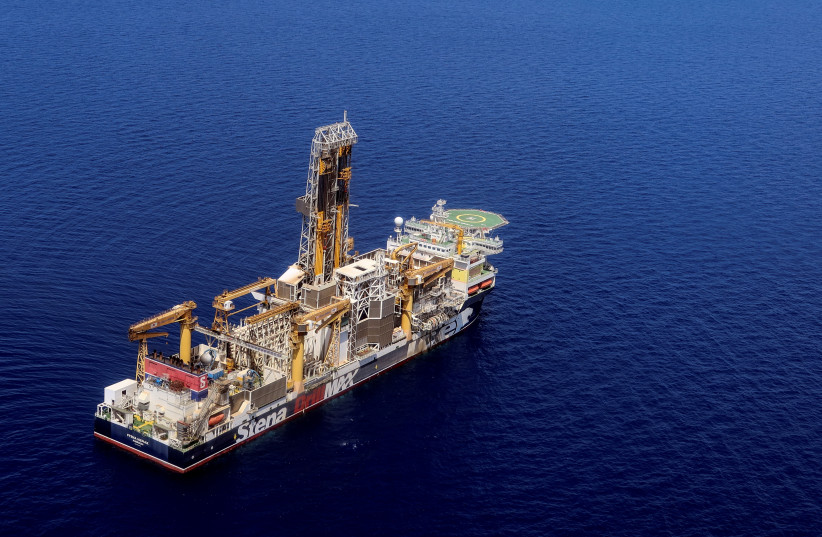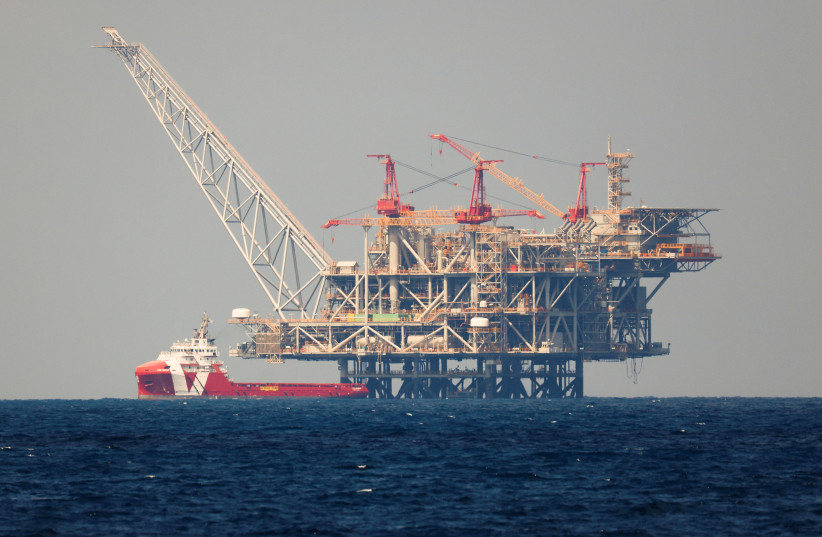Israel is preparing for a possible confrontation with Hezbollah after rejecting increased demands from Lebanon in maritime border talks on Thursday.
Defense Minister Benny Gantz instructed the defense establishment “to prepare for any scenario in which tensions increase in the northern arena – including defense and offense readiness,” his office said.
The instruction was issued following an assessment of the situation with IDF Chief of Staff Lt.-Gen. Aviv Kohavi and other senior military officers and defense officials.
Shortly afterwards, the Security Cabinet authorized Prime Minister Yair Lapid, Gantz and Alternate Prime Minister Naftali Bennett to take decisions if there were to be an escalation in the North. Gantz warned that Israel will defend its infrastructure regardless of the outcome of negotiations.

“If Hezbollah tries to harm [Israeli infrastructure or sovereignty], the military cost to Lebanon and Hezbollah will be very high,” he said at a memorial ceremony for the fallen of the Yom Kippur War of 1973.
PM Yair Lapid rejects Lebanese counter-proposal
Lapid rejected changes proposed by Lebanon to a maritime border agreement drafted by the US, a senior diplomatic source said on Thursday. The prime minister emphasized to US Energy Envoy Amos Hocstein that Israel would not make any more concessions.
Hochstein’s draft, presented to Israel and Lebanon last week, was meant to be close to the final version of an agreement settling the dispute over the countries’ economic waters. Lebanon submitted its comments on the draft on Tuesday.
Lapid assessed some of the demands to be new and significant, and instructed the negotiating team to reject them.
“Prime Minister Lapid made clear that he will not compromise on Israel’s security and economic interests even if it means there will not be an agreement soon,” the source said.
The source said that one of the Lebanese demands that Lapid rejected was that Total Energy, the French petroleum giant that holds the license to develop the Kana gas field, buy out the portion of the reservoir in Israeli waters, whereas the proposal that Israel agreed to accept stated that Total would pay royalties to Israel for the gas extracted from its waters.
Lebanon refuses to accept 'buoy line'
Exploration has not yet begun in Kana and the amount of gas in the reservoir is unknown so an immediate buyout could fall short of the actual value of the gas in Israeli waters.
Another element that Lapid rejected was Lebanon’s refusal to accept the “buoy line” as a border. The line in question is an obstacle extending 5 km. into the sea from Rosh Hanikra, along the border with Lebanon. The government has argued the line was vulnerable because Israel had established it unilaterally as a zone necessary for it to have freedom of action for its security, and the agreement with Lebanon would enshrine that line in international law.
The “buoy line” is what Lapid’s government has presented as the primary achievement of the negotiations over Israeli security. However, in the ensuing days, Lebanon asked to change the language describing the “buoy line” to avoid accepting it as an international border.
Even as Israel rejects those demands, it “will extract gas from the Karish rig at the moment that it will be possible,” the source stated.
The Security Cabinet, which discussed the latest developments in the talks with Lebanon concurred that progress at Karish should continue as planned.
Karish, an Israeli gas field, is adjacent to Kana, a reservoir that spans Lebanese and Israeli waters, as well as the area in dispute. Energean, which holds the Israeli license for Karish, set up a rig about 70 km off Haifa in June and has worked towards extracting gas, while Iran-backed Lebanese terrorist group Hezbollah threatened to attack if Karish becomes operational.
“If Hezbollah or someone else tries to harm Karish or threaten us, the negotiations on the maritime line will stop immediately and [Hezbollah leader] Hassan Nasrallah will have to explain to the citizens of Lebanon why they don’t have a gas rig and an economic future,” the source added.
The White House said a deal is still possible, despite the disagreements.
“Special Presidential Coordinator Amos Hochstein continues his robust engagement to bring the maritime boundary discussions to a close. We remain in close communication with the Israelis and Lebanese,” a White House National Security Council spokesperson said. “We are at a critical stage in the negotiations and the gaps have narrowed. We remain committed to reaching a resolution and believe a lasting compromise is possible.”
Gantz spoke in favor of a deal earlier Thursday, saying that it harms Iran’s interests.
“We constantly remember the lesson of the Yom Kippur War,” Gantz said. “We must not sin by being arrogant, we must be ready for every scenario… In this context, our biggest immediate operative challenge is on our northern border. These days, the government is promoting an agreement to divide economic waters between us and Lebanon, which has economic and security impact, including harm to Iran and Lebanon’s interests in the region.”
Opposition leader Benjamin Netanyahu, however, continued to say that Lapid had surrendered to Nasrallah, and claimed credit for the prime minister’s rejection of the latest demands.
“Only the heavy pressure that my friends and I put on [Lapid] led him to back off from his surrender agreement, for now,” Netanyahu said. “Israel needs different leadership… We will not let Israel surrender to Nasrallah.”
The opposition leader also repeated his refrain that the agreement would not be legal until it is authorized by the Knesset, and therefore he will not be bound by it if he returns to the Prime Minister’s Office.
However, Israeli law only requires that international agreements be submitted to the Knesset for review, not approval, though historically, agreements involving territorial matters have been brought to the legislature for a vote.
At the Security Cabinet meeting, Interior Minister Ayelet Shaked also called for the Knesset to vote on the agreement.
Hochstein’s draft would have had Israel concede the entire triangle of economic waters that had been in dispute with Lebanon between 2012-2021, up to what is known as line 23, but not the extended triangle that Lebanon demanded in early 2021, known as line 29. It would, however, allow Lebanon to develop the entire Kana Field that extends beyond line 23.
The deal would include international recognition of the “buoys line.”

In addition, Israel would receive royalties according to the percentage of the Kana reservoir that lies in its waters, in accordance with a separate deal being negotiated with a gas consortium led by French energy company Total, which has the Lebanese license to extract gas from the field. The deal would allow Total to start work in the gas field as soon as the deal is signed.
Beirut also said it would not accept tying its ability to develop Kana to the agreement with Israel, among other demands, according to Hezbollah news outlet Al-Akhbar.
Netanyahu made his remarks hours after his release from Shaarei Tzedek Hospital in Jerusalem. He went to the hospital the night before after feeling unwell at the end of the Yom Kippur fast; all his tests were found to be normal and he felt better in the morning, his spokesman said.
